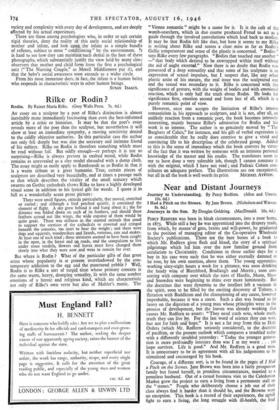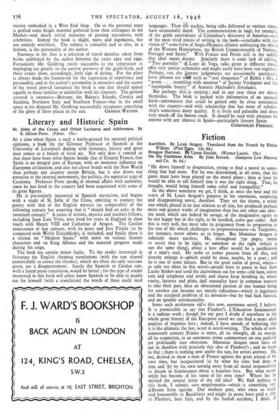Near and Distant Journeys
Journeys in the Sun. By Douglas Goldring. (MacDonald. 10s. 6d.) PERCY REDFERN was born in bleak circumstances, into a poor home, in 1875. While still a boy he was apprenticed into the drapery trade, from which, by means' of guts, brains and will-power, he graduated to the position of managing editor of the Co-operative Wholesale Society's publications. Those are the bare bones of a• book to which Mr. Redfern gives flesh and blood, the story of a spiritual pilgrimage which led him over the now familiar ground from secularism to Christianity. Conditions in those earlier days for a boy in his case were such that he was either eternally damned or he rose, by his own exertion, above them. The young apprentice, working sixty-eight hours a week for a pittance, was soon drinking the heady wine of Blatchford, Bradlaugh and Morris ; soon con- sorting with company over which the stars of Hardie, Mann, Shaw and Snowden were beginning to shine ever more luminously. But the doctrines that were dynamite to the intellect left a vacuum in the spirit, soon to be filled by the exciting discovery of Tolstoy, a flirtation with Buddhism and the championing of any cause, however improbable, because it was a cause. Such a diet was bound to lie heavy on the digestion of a young man whose principles were in the process of development, but the leaven was already working that causes Mr. Redfern to assert: "They need truth now, whole truth, truth they can live try. For the last word of science they can wait, but not for faith and hope." It is not a far step front this to Holy Orders (which Mr. Redfern seriously considered), to the doctrine of pacifism, or the present outlook which compares a troubled today with a differently troubled yesterday: " Today the younger genera- tion is more profoundly insecure than was I at my worst . . . yet hope survives. Life is good." And Mr. Redfern is a good man. It is unnecessary to be in agreement with all his judgements to be stimulated and encouraged by his book.
Courage, of a different sort, is to be .found in the pages of I Had a Pitch on the Stones. Jane Brown was born into a fairly prosperous family but found herself, in penniless circumstances married to a penniless husband. -Out of a casual business visit to circumstances, Caledonian Market grew the project to earn a living from a permanent stall on the "stones." People who deliberately choose a job out of their class always find it harder than it should be, and the Browns were no exception. This book is a record of their experiences the uphill fight to earn a living, the long struggle with ill-health, the final
victory embodied in a West End 'shop. On to the personal story is grafted some bright material gathered from their colleagues in the Market—and much trivial nonsense of passing encounters with celebrities. Indeed the book is slight, naive and ingenuous, but not entirely worthless. The subject is colourful and so also, in a fashion, is the personality of the author.
ourneys in the Sun is a selection of travel sketches taken from books published by the author between the years 1925 and 1940. Fortunately Mr. Goldring rarely succumbs to the temptation of impinging too greatly on the narrow preserve of the guide-book, and these essays show, accordingly, little sign of dating. For the place is always made the framework for the expression of experience and personality, and as the author's personality is attractive and the scenes of his travel proved favourites the book is one that should appeal equally to those familiar or unfamiliar with his itinerary. The ground covered is extensive—Brittany, the Balearic Islands, Corsica and Sardinia, Northern Italy and Southern France—but in the small space at his disposal Mr. Goldring successfully recaptures something of the glory of these places in the sun. GFtAHAM WATSON.



























 Previous page
Previous page